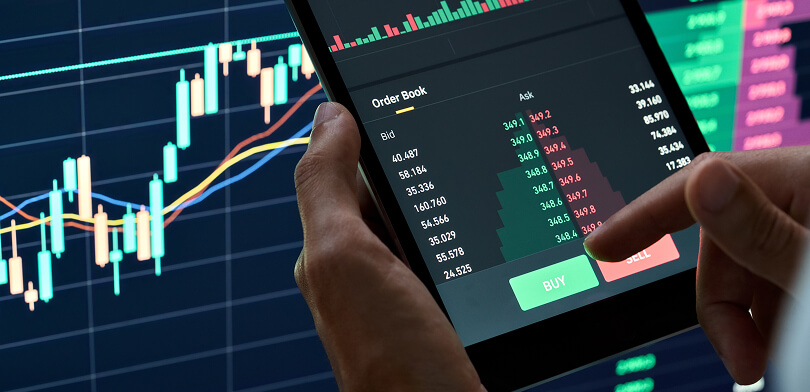Overtrading is a common issue many traders encounter, often leading to significant losses and financial strain. Understanding overtrading is essential for anyone involved in the stock market to ensure they make informed and strategic decisions.
Here, we will delve into the overtrading meaning, the problems it can cause, the underlying causes, and strategies to avoid it. Additionally, we’ll compare overtrading with understanding to understand trading behaviours comprehensively.
Topics Covered :
- What is Overtrading?
- What are the Problems Associated With Overtrading?
- What are the Causes of Overtrading?
- How to Avoid Overtrading?
- Overtrading Vs Undertrading?
- Conclusion
What is Overtrading?
Overtrading refers to the excessive buying and selling of financial instruments, often driven by emotional and impulsive decisions rather than strategic analysis. This behaviour is characterised by frequent trades, high transaction volumes, and misusing a trading account.
Traders who overtrade typically do so in an attempt to capitalise on short-term market movements, but this approach often backfires, leading to substantial financial losses.
What are the Problems Associated With Overtrading?
Overtrading can cause various problems for traders, both financially and psychologically. Understanding these issues is crucial to avoid falling into excessive trading. Here are the key issues associated with overtrading problems:
High Transaction Costs
Frequent trading increases transaction costs, including brokerage fees, taxes, and other charges. These costs can quickly erode profits, making it difficult for traders to achieve their financial goals. For instance, every trade executed incurs a fee, and when trades are numerous, these fees add up, significantly reducing the net gain from trading activities. Considering these costs when planning trading strategies is essential to ensure that expenses don’t entirely consume profits.
Increased Risk
Overtrading exposes traders to higher risks. By taking numerous trades, traders may not have the time to conduct thorough research and analysis, leading to poor investment decisions and significant losses. When traders constantly enter and exit positions, they might miss critical information that could impact their decisions.
Emotional Stress
The pressure to constantly monitor the market and execute trades can cause emotional stress and fatigue. This stress can impair decision-making abilities, leading to further losses and a cycle of overtrading.
Traders may find themselves glued to their screens, trying to catch every market movement, which can be mentally exhausting and detrimental to their overall well-being. Managing emotional stress is crucial for maintaining a clear, focused mindset for successful trading.
Poor Portfolio Performance
Overtrading often results in suboptimal portfolio performance. Instead of holding on to high-quality investments for the long term, traders may frequently buy and sell, missing out on potential gains and compounding their losses.
This constant churning of the portfolio can prevent the investments from realising their full potential, as frequent trades may disrupt the growth trajectory of otherwise solid assets.
Capital Depletion
Continuous trading without a clear strategy can deplete trading capital. This not only affects current trading activities but also limits future profit opportunities. When capital is eroded due to excessive trading, it reduces the trader’s ability to participate in new opportunities, thereby hindering long-term growth and profitability.
What are the Causes of Overtrading?
Understanding the causes of overtrading can help traders identify and address this behaviour. Here are some common factors that contribute to overtrading problems:
Lack of a Trading Plan
Many traders enter the stock market without a clear plan or strategy. They are likely to make impulsive decisions based on market fluctuations without a structured approach. A well-defined trading plan outlines specific goals, entry and exit points, and risk management strategies, which can help prevent impulsive trades driven by short-term market movements.
Emotional Trading
Emotions such as fear, greed, and excitement can drive traders to overtrade. For example, the fear of missing out (FOMO) can lead to impulsive buying, while panic can result in rapid selling. These emotional responses often override logical analysis, leading to poor trading decisions and increased risk. Recognising and managing these emotions is crucial to maintaining a disciplined trading approach.
Desire for Quick Profits
The allure of quick profits can tempt traders to execute numerous trades in a short period. However, this approach often overlooks the importance of thorough analysis and long-term planning. Chasing quick gains without proper research can result in significant losses, as impulsive trades are less likely to be based on solid analysis.
Overconfidence
Overconfident traders may believe they can consistently predict market movements and generate profits through frequent trading. This mindset can lead to excessive trading and significant losses. Overconfidence can cause traders to take on unnecessary risks and ignore potential warning signs, ultimately leading to detrimental outcomes.
Market Volatility
High market volatility can create an environment where traders feel compelled to react quickly to price changes. This reactive behaviour often results in overtrading. While volatility can present opportunities, it also increases the risk of making hasty decisions without considering the broader market context. Traders must learn to navigate volatility with a calm and measured approach.
How to Avoid Overtrading?
Avoiding overtrading requires a disciplined approach and a well-defined strategy. Here are some practical tips to help traders avoid the pitfalls of overtrading:
- Develop a Trading Plan: Create a detailed trading plan that outlines your goals, risk tolerance, and strategies. Stick to this plan to avoid impulsive decisions.
- Set Limits: Establish limits on the number of trades you execute within a specific period. This can help prevent excessive trading and promote more thoughtful decision-making.
- Focus on Quality: Prioritise the quality of trades over quantity. Conduct thorough research and analysis to identify high-quality investment opportunities.
- Manage Emotions: Recognise the impact of emotions on your trading decisions. Practice mindfulness and stress management techniques to maintain a calm and rational mindset.
- Review Performance: Regularly review your trading performance to identify patterns of overtrading. Use this information to adjust your strategy and improve future outcomes.
Overtrading Vs Undertrading
Understanding the balance between overtrading and undertrading is crucial for successful trading. Here is a comparison of overtrading and undertrading:
| Aspect | Overtrading | Undertrading |
| Frequency of Trades | High frequency, numerous trades | Low frequency, few trades |
| Risk Level | High risk due to lack of thorough analysis | Low risk but may miss out on potential gains |
| Transaction Costs | High due to frequent trading | Low due to fewer trades |
| Emotional Impact | High stress and emotional fatigue | Low stress, more stable mindset |
| Portfolio Performance | Often poor due to lack of strategy | Potentially stable but may lack growth |
| Capital Management | Risk of capital depletion | Better capital preservation |
Both overtrading and undertrading have their respective issues. Striking a balance between the two is essential for optimal trading performance.
Additionally Read: Demat Account Meaning
Conclusion
By understanding the overtrading meaning, identifying the causes and problems, and implementing strategies to avoid them, traders can enhance their trading practices and achieve better outcomes in the stock market.
A disciplined approach, combined with thorough research and emotional management, can help traders effectively navigate the market’s complexities.












